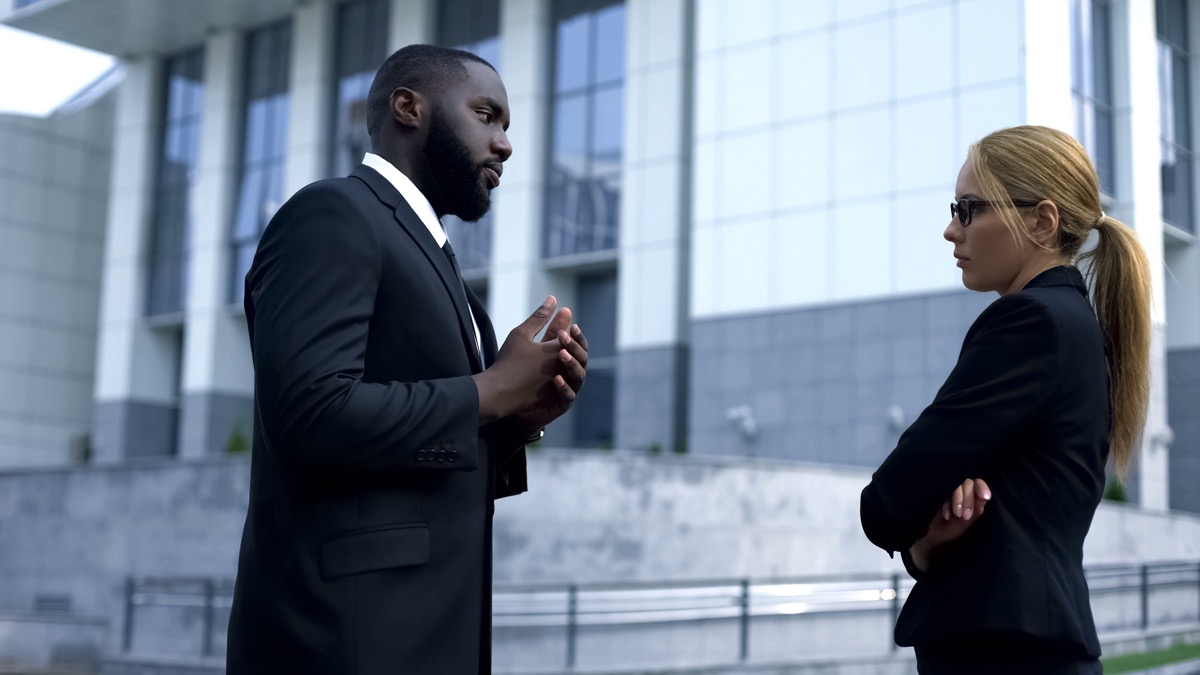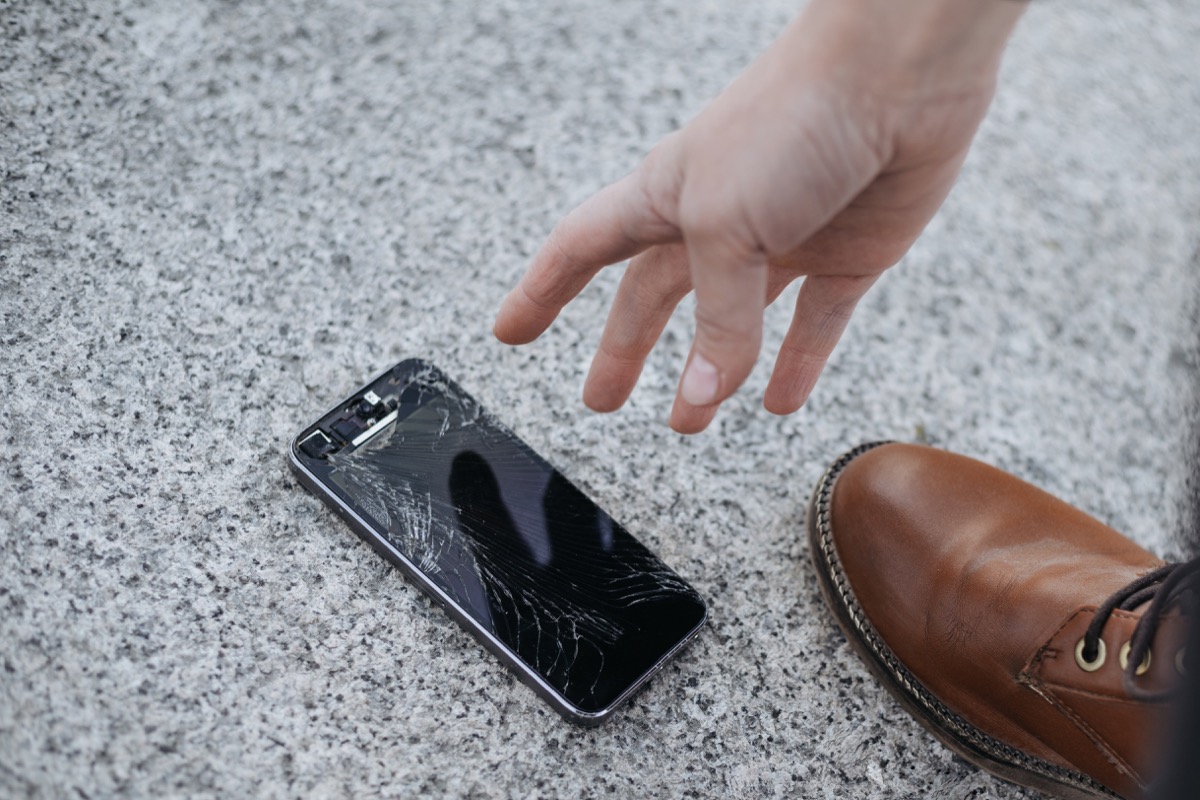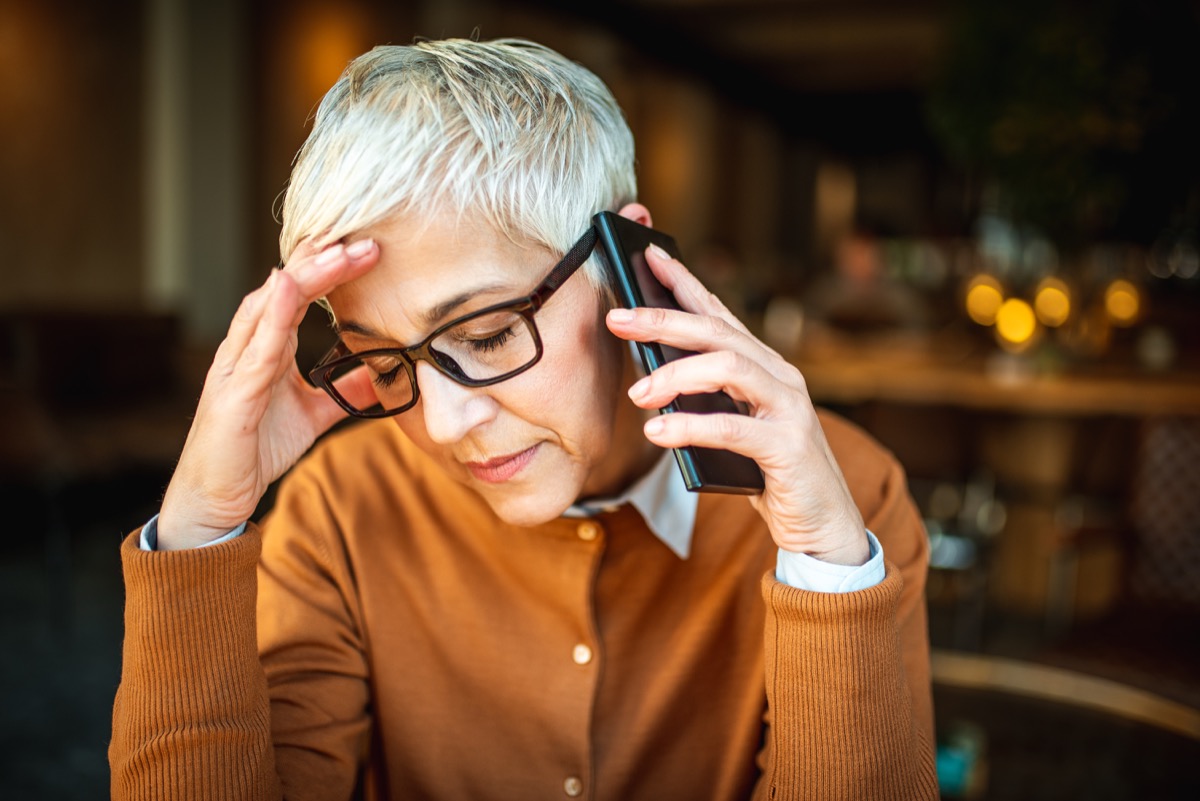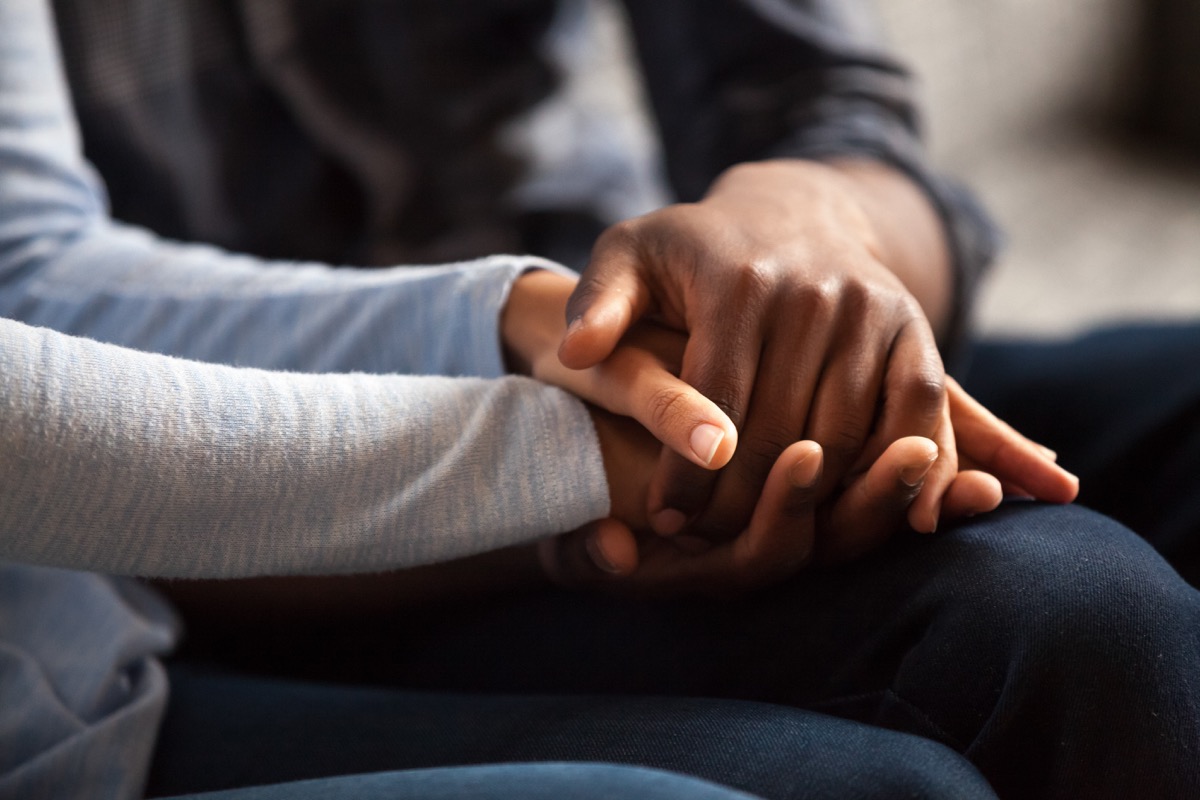15 Signs That You Apologize Too Much, According to Experts
If you're constantly saying "I'm sorry," you may be apologizing more than you should be.

Have you ever been told to stop apologizing so much? While it may feel like a friend poking fun at your nervous habit, they might actually be trying to help you break a bad cycle. After all, psychologist Justine A. Grosso says that over-apologizing is an "interpersonal habit pattern with roots in low self-respect, perfectionism, and fear of disconnection." If you're worried you're saying "I'm sorry" more often than you should be, see if you fall in line with any of these expert-backed signs that you apologize too much.
1
You apologize for things you have no control over.

The biggest red flag that you may be a chronic over-apologizer is that you apologize for things you have or had no control over, says Brent Sweitzer, LPC, a counselor in Georgia. Did you say "I'm sorry" to a coworker because it was raining outside, and they got wet? Apologize to someone for a mistake they made? These are clear signs that you're overextending the use of "I'm sorry," says Sweitzer. Rather than apologizing for things that you didn't contribute to and can't change, try expressing sympathy for the other person's frustration or distress instead.
2
You apologize for someone else's actions.

Over-apologizing can be the result of us projecting someone else's responsibilities onto ourselves, as if we feel the need to make apologies they should be making themselves.
"In essence, we often learn habits of apologizing in childhood. Women, in particular, are generally raised to be responsible and considerate of others and, sometimes, overly responsible in regard to making apologies," says Carla Marie Manly, a clinical psychologist in California. "This leads some people to tend to apologize for the actions of others, whether it's the errors of a partner or a boss."
3
You apologize for normal, everyday situations.

There are some parts of life that are normal things people go through every day. For instance, sneezing in a quiet office or needing to squeeze by someone sitting down so you can get to the bathroom. There's no need to say "I'm sorry" in these situations, but many people still find themselves doing it.
Lynell Ross, certified wellness coach and founder of Zivadream, recommends thinking about how you can rephrase what you are actually trying to communicate before you speak. So instead of scooting past someone with another apology, say something more along the lines of "excuse me."
4
You apologize to inanimate objects.

Have you ever found yourself saying "I'm sorry" after accidentally bumping into a chair, even though the chair is an inanimate object? As Andrea Brandt, PhD, writes for Psychology Today, this is mostly a female habit of "reflexively" apologizing because women are conditioned to over-apologize. And the research backs up a gender disparity: A 2010 study published in Psychological Science showed that women tend to apologize more than men because they believe their offenses are more severe—even if it's accidentally dropping a phone on the ground.
5
You're not sure why you're apologizing.

There's no harm in saying sorry when it's the time and place for it, says Tina Tessina, PhD, psychotherapist and author of Dr. Romance's Guide to Finding Love Today. But she says that if you find yourself apologizing every single day, and you're not even sure why, that's a clear indicator that apologizing has become a habit for you, rather than something you do when it's needed. To combat this, Tessina recommends "slowing yourself down and checking out why you want to apologize and whether it's warranted."
6
You apologize for things you don't believe are wrong.

If you genuinely feel the need to apologize, then go ahead. However, the trouble comes when you start apologizing for things you don't actually believe are wrong, says David Bennett, certified counselor and co-founder of The Popular Man. For instance, if you say "I'm sorry" for believing something someone else disagrees with, you don't actually mean to apologize. Bennett says he coaches his clients to be intentional with their apologies, which means not saying sorry just because a situation is awkward or there's conflict.
7
You apologize when asking for something.

When you need a favor from a friend or you're giving a coworker instructions for an assignment, there's no need to supplement it with an "I'm sorry." Courtney Crisp, MA, a therapist in California, says asking for something doesn't require an apology.
"I think one of the main reasons people apologize t0o much is a fear of taking up space and inconveniencing others," says Crisp. "This can have many causes, but I think many times growing up we can get the message our presence is unwanted and those lessons can really be internalized and stay with us." She recommends replacing "I'm sorry" with "thank you."
8
You're repeating your apology over and over.

You should actively listen to yourself when you're apologizing, says Sherianna Boyle, author of Emotional Detox for Anxiety. If you find yourself repeating an apology, it may be a sign that over-apologizing is a habit for you—rather than something you do with intention.
"The next time you go to apologize consider pausing by pulling your navel toward your spine, as if you are putting a tight belt on. This is your brake pedal," she says. "Once your navel is all the way back release it so that your abdominal puffs out and you get a nice big inhale. Notice if the apology is less apt to roll off your tongue. Allow yourself thirty seconds to sit with the discomfort so you can give yourself a chance to feel what is coming up."
9
You're always apologizing in the workplace.

Many times, chronic over-apologizers will find themselves apologizing in the workplace for things that don't require an apology. And this constant need to apologize can make employees seem less confident and less prepared for the job—no matter the career field. In fact, during a Variety interview in 2015, actress Amy Schumer revealed that one of the best lessons she learned was "not to apologize before putting my two cents in. I noticed I was starting my sentences with 'sorry' and I cut that out and left the set feeling very empowered."
10
You generally feel unsure of yourself and the things you do.

If you're typically unsure of yourself or lacking confidence, you may also be prone to apologizing more than necessary. Psychotherapist Karen Koening says she often notices someone is apologizing too much if they "walk around feeling they've done things wrong most of the time." The act of over-apologizing makes it easier because it allows them "to hold in feelings of guilt and defectiveness," even if they're not in the wrong.
11
You always feel nervous when you're apologizing.

If you feel anxious when you're saying sorry, you might have developed the habit of over-apologizing as a means to cope, says Boyle.
"Apologizing too much can be a sign of anxiety," she says. "In other words, it can be the way you manage emotions of fear, nervousness, and worry. Rather than feel these emotions instead, you contain them by apologizing." Boyle recommends getting help with your anxiety to, in turn, help break your habit of constant apologies.
12
You apologize when you're trying to be assertive.

Some people have a fear of being seen as aggressive when they want to be assertive, so they resort to just apologizing instead. As former therapist Gini Beqiri wrote for Virtual Speech, when being assertive, "the aim is to say 'no' without feeling that you have to apologize." Assertiveness and apologizing are not interchangeable, but those who over-apologize often find themselves swapping out a direct "no" for an "I'm sorry, but…"
13
People roll their eyes or tune you out when you apologize.

Unfortunately, apologizing too much can quickly become a case of "the boy who cried wolf." If your apologies are just the result of habit and not sincerity, you may notice the people around you getting annoyed or tuning your apologies out.
"When you're repeatedly lied to by someone, you stop believing what that person says. They lose face. Constantly saying 'I'm sorry' can have the same effect," workplace coach Melody Wilding writes on her website. "Unwarranted apologies not only bloat your speech and detract from the clarity of your message, but also dilute the power of the phrase to a point where it may come off as disingenuous."
14
Or they expressly tell you to stop apologizing.

While it may seem like your friends and family are giving you a hard time, if you're often told to "stop apologizing so much," chances are you're actually guilty of it, says Lauren Cook, MMFT, a therapist in California.
"The biggest indicator that you apologize too much is that people will tell you so," she says. "If you often get feedback that you apologize unnecessarily, this is the greatest clue that you may be overly sorry. If you worry that you are taking up too much space, that you are frequently inconveniencing others, or ruminate after the fact that you bothered someone, these can also be signs that you're unnecessarily seeking forgiveness."
15
You find it hard to leave it at "I'm sorry" when an apology is actually necessary.

When you're always apologizing, especially for things that don't warrant an apology, you may think that an "I'm sorry" is not sufficient when you actually need to apologize. You've spent so much time saying sorry for minuscule things that when situations are escalated, you might feel your response needs to be equally heightened—even if an apology is enough. Cook says that you should practice not giving into your urge to always apologize and instead "trust that others will give you feedback when they expect an apology."





















